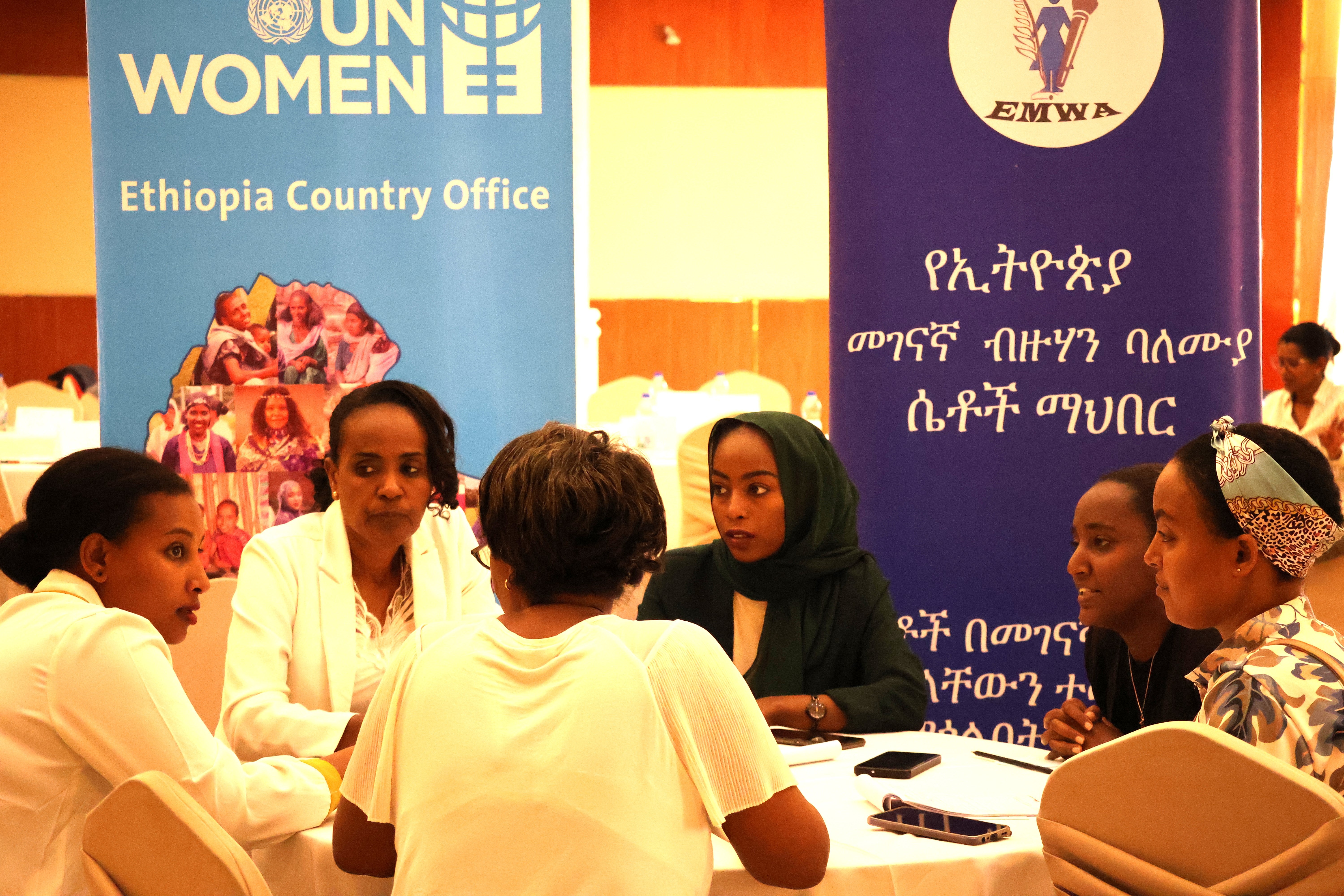Supporting gender responsive reporting in migration prone areas as a catalyst to effective media reporting in Ethiopia
Date:
UN Women Ethiopia in partnership with the Ethiopian Media Women Association (EMWA) organized a three-day capacity building training workshop on gender - responsive reporting on migration targeting women journalists and decision makers working in media institutions from migration prone regions of Ethiopia.
The workshop held from 4-6 September 2024 in Addis Ababa trained twenty-five participants from print and electronic media including journalists, editors, and reporters who mostly are members of the association. Through creating awareness on gender dimensions of migration, gender-responsive reporting, the challenges in migration reporting in Ethiopia as well as on ways of combating misinformation and shaping the narrative on gender and migration; the workshop aimed to enhance quality and effective media reporting with a focus on making migration safer.

The workshop was facilitated by an expert covering various topics including; challenges of migrants in the 21st century and the role of media, differentiating key terms such as migrants, IDPs(Internally Displaced Persons), and refugees; which were usually misunderstood and misreported by participants, the role of migration in development, the push and pull factors in general and to women in particular, the global compact for safe, orderly, and regular migration, gender and the media as well as the latest migration trends in Ethiopia. Through small group discussions and practical exercises on individual gender-responsive story framing backed with available studies; the participants were able to enhance their reporting skills on the gender dimensions of migration.
One of the participants, Zelalem Getachew, Chief Editor as well as Quality & Branding Expert at the Amhara Media Corporation has a thirty - year experience at the media house comprising print, electronic and digital Media. She was among the Ethiopian Media Women Association establishers for her region. According to her the workshop was the first of its kind, which enabled her to identify the gender gaps in migration reporting and on how to bridge them. She said that although she has many years of experiences in the media profession, without consistent capacity building initiatives to update oneself on the changing dynamics being at media institutions for long time alone may not make a difference. On the knowledge she gained Zelalem added, “ The key lesson I learnt from this workshop is on the importance of understanding human movements as a human right issue and to not negatively perceive migration. Since there are laws and regulations at global and national levels as media professionals, mine and my colleagues’ role is to provide timely, consistent, and reliable information from trusted source for the migrants including women to make their own decisions. Once we reported on cases related to migrant women or returnees, we were not tracking to report on their progress or challenges. The workshop underscored the importance of follow up reporting to promote safer migration. I believe this is vital.”
Zelalem added that unless all the concerned contribute to deal with the root causes of irregular migration for women and girls in her region like child marriage, which she notices as one of the reasons for irregular migration, the media alone may not bring a lasting solution, “ In some parts of Amhara region, there is still the culture of marrying a girl child while she is in the womb and being raised on how she will be taking care of her husband. Those who escape this and migrate do not find their husbands being faithful when they return and may end up with HIV/AIDS. If media and the society as a whole educate girls, they will know their rights and the ways for safe migration."

Abeba Lendido, the Deputy Educational Program Producer and Editor at the Southern Region Television and Radio media house noted the region’s exposure to irregular migration through different routes. She explained how her media house will contribute to addressing irregular migration based on the knowledge gained from the workshop, “Even if our educational program has a section covering women issues, this workshop revealed that we are not addressing migration related issues considering the complexity and scope of the problem in the region. Working for government owned media myself, in collaboration with my colleagues will rigorously contribute on educating the public on the different aspects of migration involving migrants, families, returnees as well as all the relevant institutions. At my office we have a weekly meeting of editors, and this will be one of the platforms I aim to use and share the knowledge gained from the workshop. In my view, the commitment for safe migration needs to be like the government’s recent country wide effective daily campaign for planting trees.”

UN Women Ethiopia is implementing the Making Migration Safe for Women (MMS) project funded by Federal Government of Germany from 2023 - 2025 to ensure that migration is safe, and orderly for women migrating from, into and through Ethiopia and that international norms and standards for protecting and promoting migrant women’s rights are strengthened. The gender responsive reporting workshop to journalists from migration prone regions was organized under MMS project. It is an extension of a similar two-day workshop held in December 2023 targeting media professionals within Addis Ababa. UN Women Ethiopia and partners organized media training on gender - responsive reporting on migration. | UN Women – Africa